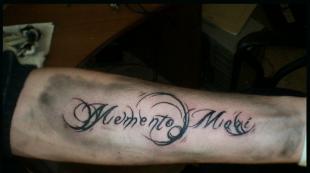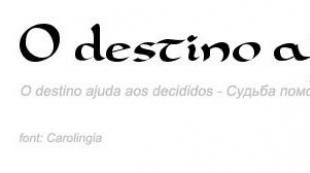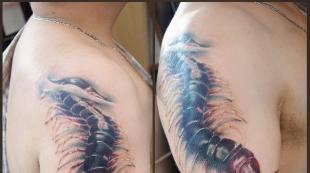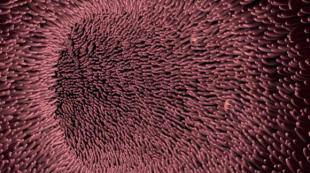How to enter universities in Switzerland: programs for admission to universities in Switzerland, features. The main thing is the language. Average student tuition and living costs
Swiss universities are regularly ranked in the top 10 international rankings. At the same time, the cost of studying at public universities in Switzerland is not as high as it might seem. The most eminent educational institutions are ready to provide students with higher education for only 1000 francs per year.
The cost of education is really high only in the best universities in Switzerland related to the hospitality industry and the field of business or finance. But even here it is compensated by paid internships and providing students with part-time jobs. That is why Swiss universities are so attractive to foreigners. In total, about 30% of students studying in the country are foreign citizens.
Swiss universities are divided into research and universities of applied sciences or arts, institutes and colleges. Since 2001, a new type of educational institution has appeared - a pedagogical university.
REQUIREMENTS FOR APPLICANTS FOR ENTRY TO HIGHER EDUCATION INSTITUTIONS IN SWITZERLAND
They vary depending on the location of the institution. For admission in the French-speaking or Italian-speaking part of the country, a high school diploma is sufficient. In the German-speaking cantons, only second- or third-year students of an educational institution who decide to continue their studies abroad can count on studying at Swiss universities.
In any case, there are general requirements for all private and public universities in Switzerland:
- knowledge of the language of instruction, confirmed by a certificate;
- English proficiency;
- complete secondary education and above.
The best universities in Switzerland often require successful completion of an exam common to all foreign citizens.
In addition, an important role is played by the average score of the certificate, which must be at least four.
Slightly fewer conditions are set by Swiss universities in English. To start learning in them, it is enough to know only it well, without any tests or exams in other languages.
The vast majority of hospitality and business schools in general offer programs exclusively in English, so becoming a student is much easier.
APPLICATION PROCESS TO SWITZERLAND UNIVERSITIES (HOW TO APPLY)
Swiss universities offer the usual admission scheme:
- choose one of the best universities in Switzerland;
- go to his official website;
- fill out and submit the application;
- waiting for confirmation of its registration;
- conduct an online consultation with a college or institute specialist;
- pay the registration fee;
- provide a copy of the certificate with grades and a certificate of academic performance from the university;
- pass a language proficiency test;
- send the results of the general exam (if necessary);
- send a motivation letter and recommendations.
If you understand that you will not be able to pass the tests well, then you should not waste your time and money. There are many preparatory programs in the country where you can study calmly, slowly improve your English language skills and deepen your knowledge in major subjects.
In addition, preparatory programs help to get the missing level of education in the German cantons, eliminating the need to become a student of an unnecessary university. While studying on the program, you can take a language test, as well as get timely advice from professors.
STUDYING PROGRAMS
Higher education in this state can be obtained at any level. If we talk about the universities of Lausanne, Geneva or Zurich, then they always have undergraduate, graduate and postgraduate programs.
Universities of applied sciences and arts also award bachelor's degrees, while master's and postgraduate programs exist in selective specialties.
A wider range of courses are offered by educational institutions related to the hospitality industry. In them, you can get a certificate in just a year, opening the way to practice in your specialty. It takes two years to study for the award of a diploma of higher education. Then there are the standard bachelor's and master's degrees.
SWITZERLAND UNIVERSITY RANKING
The ranking of the best universities in Switzerland is headed by ETH Zurich, specializing in the field of natural sciences and technology. Interesting for students with well-established curricula and the most a large number Nobel laureates. Like many other universities in Switzerland, in English offers a fairly large selection of specialties.
The second recognized representative of the technical universities of Lausanne - Ecole Polytechnique Fédérale de Lausanne. To enter the TOP ranking of universities in Switzerland, he was helped by international recognition, attracting him to receive higher education great amount foreign students.
The third place was taken by one of the calmest and safest universities - the University of Zurich. It is distinguished by the amazing composition of the campus population, both children and their parents can study here at the same time.
The fourth position is occupied by one of the universities of Geneva - the University of Geneva. The University of Geneva is one of the oldest French-speaking educational institutions in the country.
Next comes the University of Basel, always ranked among the best universities in Switzerland. In addition, it is also the oldest university in the state.
The standard of living of the Swiss can be envied, because it is one of the richest and safest countries in the world. Such a stable prosperity of Switzerland is largely due to the high level of education of the population.
The local education system provides continuity at all stages of education - from school to university, so many foreigners come from all over the world to study here. Traditionally, higher education in Switzerland enjoys the greatest success, showing unsurpassed quality in teaching business, management and tourism. These industries have received the greatest development in the country, so Swiss universities are considered the best in training qualified personnel in these and related specialties.
Switzerland: Top Universities in Tourism
If your goal is a prestigious and truly high-quality tourism education, StudyLab offers the best options for studying in Switzerland. The opinions of world experts agree that the best specialists in the field of tourism, hotel and restaurant business come out of the walls of Swiss universities:
- Les Roches International School of Hotel Management
- Glion Institute of Higher Education
- Cesar Ritz Hotel
These universities have maintained an impeccable reputation due to the fact that they are practice-oriented. For example, training in the hotel business is not complete without regular internships in hotels in Switzerland and other countries, where you can gain useful knowledge and experience in your specialty, and in the future, perhaps even get a permanent job in a well-known European hotel chain.
Business and Management - study on the best programs
European University Geneva and Geneva Business School are leaders in management and business education. Despite the fact that these universities were founded relatively recently, they have now become universities with a worldwide reputation. Studying in Switzerland at the faculties of business and management is a direct path to international corporations, politics and entrepreneurship. The knowledge and skills gained at these universities give you a chance to get ahead of the competition and get the job of your dreams.
The cost of higher education in Switzerland is higher compared to other European countries, but the number of applicants is only increasing every year. Students know that all costs will pay off in the very first years after graduation, and a prestigious education will remain forever.
Second higher education in Switzerland - a new start for ambitious people
The sphere of business and tourism is constantly evolving, so even the most skilled specialist must improve his skills from time to time. To improve your skills, as well as to get relevant and extremely important knowledge for work in time, you can take courses at Swiss universities. If you are interested in a second higher education in Switzerland, StudyLab can also recommend the most suitable options for you.
Swiss universities offer their students to study advanced technologies and experience gained in the field of tourism, business and management by leading world experts. This country is ideal for those who are going to get a higher education abroad not for show, but for active use in work and social life.
Today, not everyone can get higher education at universities in Switzerland, despite the affordable cost compared to English-speaking countries. Most famous businessmen and politicians tend to educate their children in this country. The high quality of education received here is known almost all over the world. A diploma from a Swiss university is a fairly serious argument for obtaining a prestigious position in any corporation in the world. Universities in Switzerland for foreigners and residents of the country provide a unique opportunity to receive a prestigious higher education and open the way to a successful future.
Zurich University
Universities in Switzerland
When choosing a higher education institution in Switzerland, one should first of all be guided by the presence of the desired faculty and, of course, the language of teaching. Among the main cantonal universities are:

Benefits of a Swiss education
In educational institutions in Switzerland, traditions known for a long time are still honored. Here, the quality of education has always been in the first place, which makes it possible to prepare real professionals. Upon graduation, each student is given state guarantees for high level professionalism in the field of study profile. In this country, there is a rather interesting approach to the preparation of the curriculum, which consists in combining educational activities and outdoor activities. In their free time, students have the opportunity to go mountain climbing, horseback riding, snowboarding, they can ride a horse or go fishing.
Studying at universities in Switzerland has a number of advantages, which are as follows:
- The presence of a high academic level.
- Diversity of language practice - classes in German, English, French and Italian.
- Getting a prestigious education is inexpensive.
Institutes are located in Switzerland in such climatic conditions that have a beneficial effect on the health of students. There is no place for national confrontation in the country, the level of criminal events is quite low here. 
Difficulties of studying in Switzerland
Despite all the advantages, studying in Switzerland has certain difficulties. The main difficulty in obtaining higher education in this country is the presentation of sufficiently high requirements for the acquired knowledge. This approach to education cannot be compared with any other country in Europe.
Any university in Switzerland has the full right to conduct an entrance exam, which for many applicants is an obstacle to obtaining a prestigious education. Competition also plays a key role in this, since only worthy students who have a good reputation, excellent grades and have been trained for 4 semesters in state higher educational institutions are selected for study at the universities of this country. Strict requirements are imposed here because the basis of the Swiss economy is the manufacture of high-tech and science-intensive products, and this requires professional knowledge and skills.
How to enter a Swiss university?
Swiss higher education institutions accept foreign students at least 18 years of age. Without fail, the student must know the language in which teaching is conducted at the chosen university. It is mandatory to have a document confirming that you have received a secondary education equivalent to a Swiss one. Each educational institution has its own requirements for the admission of students: 
- It is almost impossible for foreigners to enter the medical faculty, since there are not enough places for those applicants who live in the country.
- Education requirements - minimum 11 years of schooling, 3 years of high school. Knowledge of classical languages, exact sciences and humanities. The presence of a diploma that confirms the existing education and makes it possible to enter various faculties of state universities.
- Universities accept only those students who have completed their second year in their home country. The beginning of their studies here begins with the first year, exams and tests passed at home are not taken into account.
- Those students who have passed single exam held in Friborg. The examination stage consists of 3 mandatory parts - The World History, mathematics, foreign language and 2 electives. Students can choose among subjects such as biology, geography, second foreign language, physics and chemistry.
Required documents for studying at universities in Switzerland
With sufficient knowledge foreign language, obtaining a certificate and successfully passing a single exam, you can apply to any university in Switzerland. The package must necessarily consist of the following papers:
- Written application form.
- Characteristic.
- Copy of matriculation certificate.
- Detailed autobiography.
- Academic reference.
Papers are sent no later than May. Correspondence with the university takes at least 2-3 months, so each applicant should have some time left in order to be able to send documents to another university in case of refusal.
The cost of studying in universities in Switzerland
It is not very difficult to get an education in private institutions in Switzerland, but it is quite expensive. As for public universities, the situation is different. The cost of education is quite low, but the requirements for students are very high. Switzerland is the world leader in terms of accessibility of higher education. Getting a scholarship here is also not difficult, compared to an English-speaking country. Grants in Switzerland are also significant and fully cover living expenses.
Cost of education
As for free education, it is possible, but only at some universities in Switzerland. At the same time, all tuition costs for one semester and 5 months of internship are compensated. Transportation costs are not taken into account. Free education is not available to all students, but only to those who meet certain requirements put forward by one or another institution of higher education.
General information about the country.
State in Western Europe. It borders in the north with Germany, in the south with Italy, in the west with France, in the east with Austria and Liechtenstein. Population - 7.7 million people. The official languages of Switzerland are: German, French, Italian and Romansh (the latter is official only for communication with Romansh speakers). The capital of the country is the city of Bern. Largest cities- Zurich, Geneva, Basel, Bern, Lausanne. Switzerland is a parliamentary republic. The territory of the country is 41,284 square kilometers. Switzerland is the richest country in the world and one of the most important banking and financial centers of the world (Zurich is the third world currency market after New York and London).
Higher education in Switzerland.
There are 12 public universities in Switzerland: seven "classical" cantonal universities - in Basel, Bern, Friborg, Geneva, Lausanne, Neuchâtel, Zurich and St. Gallen - two small cantonal universities in university status University College of Lucerne and Universita della Svizzera Italiana in Lugano, as well as two special polytechnic schools EPF Lausanne and ETH Zurich, where they teach engineering and architecture. There are also private universities, business schools and world-famous hospitality institutions.
Subjects are taught depending on the language region: in German - in Basel, Bern, Zurich, Lucerne and St. Gallen; in French - in Geneva, Lausanne, Neuchâtel; in Italian - in Lugano; in two languages (German and French) - in Friborg.
Universities in Switzerland are subject to both the federal government and the cantons, so there is no single educational program. A mandatory minimum exists only for the faculties of engineering, law, economics and management, agriculture and design. Programs for all other specialties differ depending on which canton the university is located in. Universities regulate the number of students with an exam after the first year of study, the most difficult. After it, up to 50% of students are eliminated. Students take the same exam after the second year of study. This is followed by 2-3 years of advanced training, after which they are awarded a licentiate degree (Lizentiat) or a diploma (Diploma). These degrees correspond to a master's degree. The next stage - doctoral student (PhD) - requires another three years of study. The academic year at Swiss Universities is divided into two semesters. The winter semester starts in mid-October and lasts until early March. The spring semester starts in mid-April and ends in mid-July.
Admission to Swiss universities is made in accordance with the accepted system of competitive selection. The applicant submits documents to the university where he would like to study and waits for the decision of the selection committee. Since Swiss universities accept students from abroad, the admissions committee analyzes not only the academic performance of applicants, but also the correspondence of the level of education they received to the Swiss level. In some cases, students from abroad are asked to take a preparatory course in order to be admitted to the university.
The percentage of foreign students in Swiss universities is quite high: on average - about 18%, and at the University of Geneva - up to 33%.
In order to enter a state university, a foreign student must be fluent in German, French or Italian and perfectly pass difficult entrance exams based on educational standards.
Admission of a foreign student to the Faculty of Medicine is almost impossible: the profession of a doctor is so popular that the competition for this specialty is very high. Dental and veterinary faculties are closed to foreigners.
Therefore, for foreigners in Switzerland, private educational institutions are mainly available, which are represented by private universities of the hotel and tourism business and private business schools, for example: Les Roches Global Hospitality Education, Glion Institute of Higher Education, EU Business School.
Education in Switzerland at private universities is conducted in English and no specialty exams are required for admission. The main requirement for admission is the presence of a Russian certificate or diploma of higher education and knowledge of the English language.
The highest entrance requirements for applicants from Russia are imposed by universities in the German-speaking part of the country. To enroll in the first year, you must complete at least two courses at a Russian university and pass a special unified exam for foreigners at the admissions office in the city of Friborg. For admission to the universities of Lausanne, Geneva and Neuchâtel, where they teach in French, graduates of the Russian high school with a good (without triples) matriculation certificate, it is enough to pass a single exam.
In the system of the Higher educational education The following study programs are available in Switzerland:
- Bachelor's degree (duration of study 3.5 - 4 years)
- Postgraduate programs (duration of study up to 1.5 years). The programs are designed for those who already have a higher education and who want to change their specialization.
- Master and MBA (Master of Business Administration). The duration of training is 1 year.
Many private universities in the country offer a long-term preparatory program " English language in Switzerland, and public universities In Switzerland, you can find summer courses in German or French.
One of the unique and most demanded structures for education abroad. This country is popular among foreign and Russian children, schoolchildren, teenagers and students for one simple reason - here you can get a quality European education. The main feature of obtaining a higher education is related to the fact that in the territory of this country students from other states will be able to study not in one language, but in several. The inhabitants of this multicultural country are fluent in French, Italian, German and English. Depending on the canton, one of the official languages is the main one in the region. The rest of Europe does not have such educational resources, so hundreds of foreigners around the world are asked the question of how to enter every year.
Programs for admission to Swiss universities for foreign and Russian students - types and features
Conditions for admission to universities in this country may vary depending on the location of the university, its ranking and prestige. International students have several ways to enter a Swiss university.
Depending on the country in which the student plans to graduate, this may be an Anglo-American Pre-Collegiate ( or ) course; in various specializations - humanitarian, technical or social science; French Baccalaureate, where in the second cycle of the course, children aged 16-19 are preparing to enter universities in Switzerland, France and those countries where education in French is possible; the Italian Maturita program, in which high school students choose one of four specializations and prepare for admission to Italian or Swiss higher schools. Also on the list is the most common international pre-university training program -. This two-year course, whose certificate is recognized in more than 100 countries around the world, allows applicants to enter almost anywhere.
Foreign students can get into these programs after the 9th, 10th, 11th grade of a Russian school. In addition, Swiss universities have an annual training program at the higher education schools themselves. After completing such a program, the applicant is guaranteed to get into the first year of the bachelor's degree.
In addition to the first stage of higher education, Swiss universities accept foreign students and the second - to the master's program. As in other European countries, in Switzerland, to obtain a master's degree, you must complete a bachelor's degree + know at a very good level one of the previously named foreign languages.
Also, when choosing an educational institution, it is worth considering the priority specialization. According to Swiss education experts, economics is best taught at the universities of St. Gallen, law students go to study at the universities of Lausanne, Fiurge and Nchâtel, the exact sciences are taught at the University of Zurich, and the humanities, in particular philology, are best taught in Geneva . Swiss universities in the field of tourism and hotel business are especially famous: it is believed that Switzerland is the ancestor of these areas, therefore local universities are the best in the world ranking of the corresponding specialization.
How to apply to universities in Switzerland - the process of admission and conditions of study
It is best to start preparing for admission to a Swiss university or college at least a year before the potential start of the academic year. This is due to the fact that in addition to preparing documents, an international student will need to prepare for a language test and successfully pass a general test for all foreign students studying in Switzerland. In total, this entire process will take at least 4-6 months.
So, to become a student at a Swiss university, you need:
- Provide a high school diploma with good and excellent marks in all disciplines
- Pass the unified exam for international students. It takes place every year in Friborg in September or October. The test includes 5 subjects: three compulsory (mathematics, history and language) and two optional (chemistry, physics, geography, second language)
- Provide a certificate of knowledge of one of the European languages (depending on the chosen program)
- In the institutions of the German-speaking part, there are stricter requirements for foreign and Russian students: applicants must study at a domestic university for at least two years.
If for some reason a student feels that he is not ready to take an exam at the University of Friborg, then he has the opportunity to take training courses and improve his knowledge to the required level. Classes are held starting in June, 2-3 months before the exam.
To confirm the language level, an international student will need one of the following certificates:
- or - French
- or - German
- CELI - Italian
- or - English.
To pass any of the tests, you must sign up in advance (1-2 months in advance), then wait for the results (in 1.5-2 months), and then draw up documents for applying to universities.
Such documents will need to be prepared by a foreign student who wants to enter Swiss universities for the first stage of higher education (bachelor's degree):
- completed application form for admission to the university (online on the website or manually)
- passport and study visa
- an extract on the student's progress for the last 2-3 years
- certificate of secondary education (Russian or foreign sample)
But such documentation will be required for admission to Swiss universities for the second stage of higher education (master's degree):
- bachelor's degree diploma
- completed application for training
- an extract with student grades for the last 2-3 years
- certificate confirming confident knowledge of a foreign language according to the chosen curriculum
- recommendations of teachers from the previous place of study (2-3 reviews)
- candidate's motivation letter.
The cost of studying in universities in Switzerland, the list and rating of educational institutions
Higher educational services can only be obtained on a paid basis (the condition is valid for both local and foreign students), regardless of whether the educational institution is public or private. At the same time, the price will be almost the same for all students. On average, the annual cost of training will be 1000-2000 Swiss francs. Studying for foreign students at a university in the Italian part of the country will cost a little more - about 5-8 thousand francs. An academic year in private Swiss universities will cost even more. Separate items of expenses will be payment for accommodation, meals, pocket and transport expenses (including air travel in both directions).









